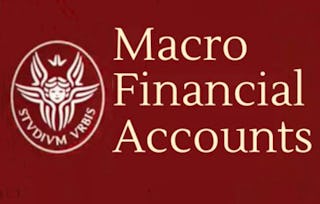This course provides an in-depth analysis of Macroeconomic Financial Accounts. Each module will delve into one specific Institutional Sector of the National Economy i.e., Financial and non-Financial Corporations, Households, the Government. The Rest of the World is also covered. Students are expected to have a basic understanding of macroeconomic principles and financial accounting. Course 1 or equivalent knowledge is recommended for those with limited experience in macroeconomic financial accounting. Proficiency in using spreadsheets for data analysis is also beneficial. Undergraduates in their final year or university students interested in monetary and financial economics, international macroeconomics, and data mining can benefit from this course. Professionals in government institutions, central banks, business, and the financial industry, along with other individuals interested in finance and macroeconomics, may also find this course valuable. By the end of this course, students will gain a deeper understanding of the financial connections among and within the institutional sectors in market economies.

Macroeconomic Financial Accounts Course 2
6 days left! Gain next-level skills with Coursera Plus for $199 (regularly $399). Save now.

Recommended experience
Skills you'll gain
Details to know

Add to your LinkedIn profile
See how employees at top companies are mastering in-demand skills

There are 6 modules in this course
This course provides an in-depth analysis of Macroeconomic Financial Accounts. Each module will delve into one specific Institutional Sector of the National Economy i.e., Financial and non-Financial Corporations, Households, the Government. Altough not considered an Institutional Sector but the complement to the Domestic Economy, the Rest of the World is also covered. Students are expected to have a basic understanding of macroeconomic principles and financial accounting. Course 1 or equivalent knowledge is recommended for those with limited experience in macroeconomic financial accounting. Proficiency in using spreadsheets for data analysis is also beneficial. Undergraduates in their final year or university students interested in monetary and financial economics, international macroeconomics, and data mining can benefit from this advanced course. Professionals in government institutions, central banks, business, and the financial industry, along with other individuals interested in finance and macroeconomics, may also find this course valuable. The lectures, tutorials, and activities guide participants step-by-step through the characteristics of the Institutional Sectors. References to the macroeconomic databanks of major national and international institutions (OECD, European Central Bank, US Federal Reserve System, Bank for International Settlements, IMF) are included. By the end of this course, students will gain a deeper understanding of the financial connections among and within the Institutional Sectors in market economies. Student activities include manipulating data downloaded from institutional websites with spreadsheets to construct tables and graphs.
What's included
10 videos12 readings1 peer review
This week’s lectures will provide a comprehensive understanding of financial corporations, their global economic roles, and their impact on monetary policy. Prepare to engage with Andreas, Gabriele, and Miguel to deepen your knowledge of this vital sector
What's included
6 videos13 readings1 peer review
This week Riccardo De Bonis from the Bank of Italy will help us understand the financial behaviour of households, a central theme in economic analysis.
What's included
5 videos10 readings1 peer review
This week we focus on the financial behaviour of non-financial corporations
What's included
4 videos8 readings1 peer review
The role of governments in the financial functions of market economies
What's included
4 videos7 readings1 peer review
The Balance of Payments and the International Investment Position.
What's included
6 videos11 readings1 assignment1 peer review
Instructors



Offered by
Explore more from Economics
 Status: Preview
Status: PreviewSapienza University of Rome
 Status: Preview
Status: PreviewO.P. Jindal Global University
 Status: Preview
Status: PreviewThe University of Sydney
 Status: Free Trial
Status: Free TrialFundação Instituto de Administração
Why people choose Coursera for their career

Felipe M.

Jennifer J.

Larry W.

Chaitanya A.

Open new doors with Coursera Plus
Unlimited access to 10,000+ world-class courses, hands-on projects, and job-ready certificate programs - all included in your subscription
Advance your career with an online degree
Earn a degree from world-class universities - 100% online
Join over 3,400 global companies that choose Coursera for Business
Upskill your employees to excel in the digital economy
Frequently asked questions
macrifinac.sapienza@uniroma1.it
To access the course materials, assignments and to earn a Certificate, you will need to purchase the Certificate experience when you enroll in a course. You can try a Free Trial instead, or apply for Financial Aid. The course may offer 'Full Course, No Certificate' instead. This option lets you see all course materials, submit required assessments, and get a final grade. This also means that you will not be able to purchase a Certificate experience.
When you purchase a Certificate you get access to all course materials, including graded assignments. Upon completing the course, your electronic Certificate will be added to your Accomplishments page - from there, you can print your Certificate or add it to your LinkedIn profile.
More questions
Financial aid available,
¹ Some assignments in this course are AI-graded. For these assignments, your data will be used in accordance with Coursera's Privacy Notice.

